2014年高考真题——英语(江苏卷)解析版含解析(单选和作文)
2014年高考真题——英语(江苏卷)解析版 Word版含解析(单选和作文)
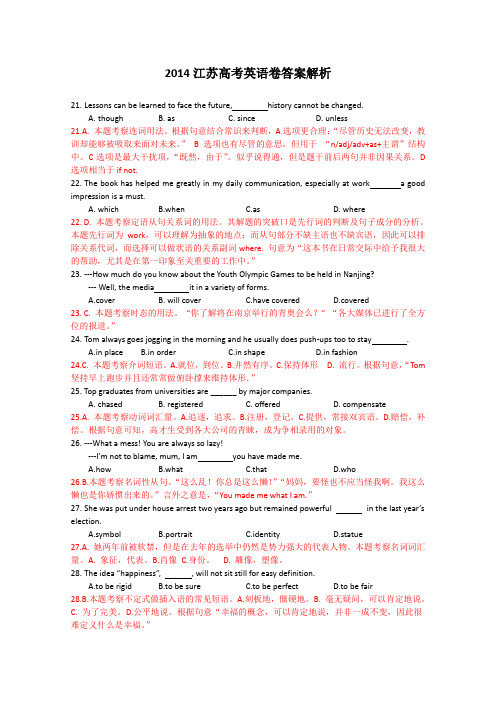
2014江苏高考英语卷答案解析21.Lessons can be learned to face the future, history cannot be changed.A.thoughB. asC. sinceD. unless21.A. 本题考察连词用法。
根据句意结合常识来判断,A选项更合理:“尽管历史无法改变,教训却能够被吸取来面对未来。
”B选项也有尽管的意思,但用于“n/adj/adv+as+主谓”结构中。
C选项是最大干扰项,“既然,由于”。
似乎说得通,但是题干前后两句并非因果关系。
D 选项相当于if not.22.The book has helped me greatly in my daily communication, especially at work a good impression is a must.A. whichB.whenC.asD. where22. D. 本题考察定语从句关系词的用法。
其解题的突破口是先行词的判断及句子成分的分析。
本题先行词为work,可以理解为抽象的地点;而从句部分不缺主语也不缺宾语,因此可以排除关系代词,而选择可以做状语的关系副词where. 句意为“这本书在日常交际中给予我很大的帮助,尤其是在第一印象至关重要的工作中。
”23.---How much do you know about the Youth Olympic Games to be held in Nanjing?--- Well, the media it in a variety of forms.A.coverB. will coverC.have coveredD.covered23. C. 本题考察时态的用法。
“你了解将在南京举行的青奥会么?”“各大媒体已进行了全方位的报道。
”24.Tom always goes jogging in the morning and he usually does push-ups too to stay .A.in placeB.in orderC.in shapeD.in fashion24.C. 本题考察介词短语。
2014年普通高等学校招生全国统一考试英语试题(江苏卷,解析版)
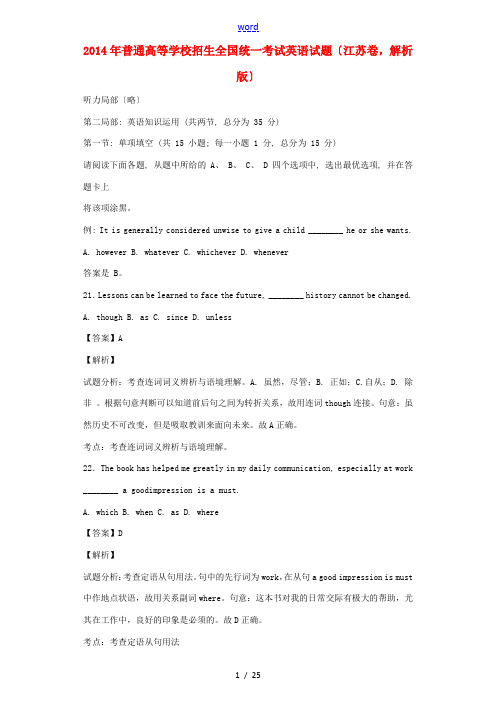
2014年普通高等学校招生全国统一考试英语试题〔江苏卷,解析版〕听力局部〔略〕第二局部: 英语知识运用 (共两节, 总分为 35 分)第一节: 单项填空 (共 15 小题; 每一小题 1 分, 总分为 15 分)请阅读下面各题, 从题中所给的 A、 B、 C、 D 四个选项中, 选出最优选项, 并在答题卡上将该项涂黑。
例: It is generally considered unwise to give a child ________ he or she wants.A. howeverB. whateverC. whicheverD. whenever答案是 B。
21.Lessons can be learned to face the future, ________ history cannot be changed.A. thoughB. asC. sinceD. unless【答案】A【解析】试题分析:考查连词词义辨析与语境理解。
A. 虽然,尽管;B. 正如;C.自从;D. 除非。
根据句意判断可以知道前后句之间为转折关系,故用连词though连接。
句意:虽然历史不可改变,但是吸取教训来面向未来。
故A正确。
考点:考查连词词义辨析与语境理解。
22.The book has helped me greatly in my daily communication, especially at work ________ a goodimpression is a must.A. whichB. whenC. asD. where【答案】D【解析】试题分析:考查定语从句用法。
句中的先行词为work,在从句a good impression is must 中作地点状语,故用关系副词where。
句意:这本书对我的日常交际有极大的帮助,尤其在工作中,良好的印象是必须的。
故D正确。
考点:考查定语从句用法23.—How much do you know about the Youth Olympic Games to be held in Nanjing? —Well, the media ________ it in a variety of forms.A. coverB. will coverC. have coveredD. covered【答案】C【解析】试题分析:考查动词时态用法。
2014年江苏省高考英语试卷解析版
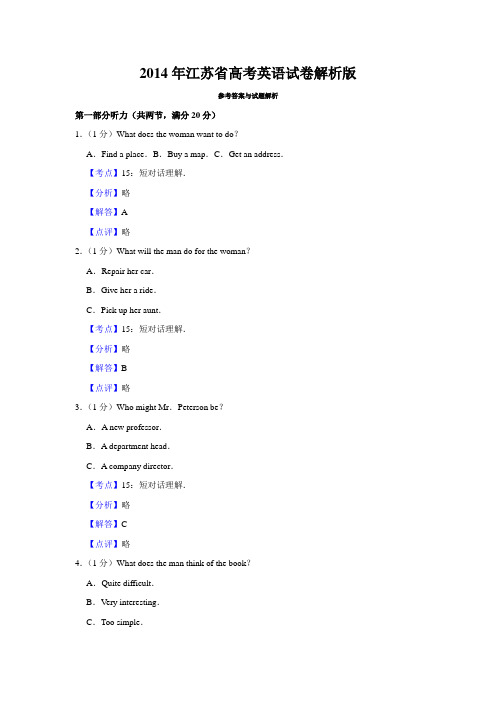
2014年江苏省高考英语试卷解析版参考答案与试题解析第一部分听力(共两节,满分20分)1.(1分)What does the woman want to do?A.Find a place.B.Buy a map.C.Get an address.【考点】15:短对话理解.【分析】略【解答】A【点评】略2.(1分)What will the man do for the woman?A.Repair her car.B.Give her a ride.C.Pick up her aunt.【考点】15:短对话理解.【分析】略【解答】B【点评】略3.(1分)Who might Mr.Peterson be?A.A new professor.B.A department head.C.A company director.【考点】15:短对话理解.【分析】略【解答】C【点评】略4.(1分)What does the man think of the book?A.Quite difficult.B.Very interesting.C.Too simple.【考点】15:短对话理解.【分析】略【解答】B【点评】略5.(1分)What are the speakers talking about?A.Weather.B.Clothes.C.News.【考点】15:短对话理解.【分析】略【解答】A【点评】略6.(2分)听第6段材料,回答6、7题.6.Why is Harry unwilling to join the woman?A.He has a pain in his knee.B.He wants to watch TV.C.He is too lazy.7.What will the woman probably do next?A.Stay at home.B.Take Harry to hospital.C.Do some exercise.【考点】16:长对话理解.【分析】略【解答】B C【点评】略7.(2分)听第7段材料,回答第8、9题.8.When will the man be home from work?A.At 5:45.B.At 6:15.C.At 6:50.9.Where will the speakers go?A.The Green House Cinema.B.The New State Cinema.C.The UME Cinema.【考点】16:长对话理解.【分析】略【解答】AC【点评】略8.(3分)听第8段材料,回答第10至12题.10.How will the speakers go to New York?A.By air.B.By taxi.C.By bus.11.Why are the speakers making the trip?A.For business.B.For shopping.C.For hoilday.12.What is the probable relationship between the speakers?A.Driver and passenger.B.Husband and wife.C.Fellow workers.【考点】16:长对话理解.【分析】略【解答】AAC【点评】略9.(4分)(1)Where does this conversation probably take place?A.In a restaurant.B.In an office.C.In a classroom.(2)What does John do now?A.He's a trainer.B.He's a tour guide.C.He's a college student.(3)How much can a new person earn for the first year?A.﹩10,500.B.﹩12,000.C.﹩15,000.(4)How many people will the woman hire?A.Four.B.Three.C.Two.【考点】16:长对话理解.【分析】略【解答】BCAC【点评】略10.(4分)听第10段材料,回答第17至20题.17.How long has the speaker lived in a big city?A.One year.B.Ten years.C.Eighteen years.18.What is the speaker's opinion on public transport?A.It's comfortable.B.It's time﹣saving.C.It's cheap.19.What is good about living in a small town?A.It's safer.B.It's healthier.C.It's more convenient.20.What kind of life does the speaker seem to like most?A.Busy.B.Colourful.C.Quiet.【考点】17:短文理解.【分析】略【解答】略【点评】略第二部分:英语知识运用(共两节,满分15分)第一节:单项填空(共15小题;每小题1分,满分15分)请阅读下面各题,从题中所给的A、B、C、D四个选项中,选出最佳选项,并在答题卡上将该项涂黑.11.(1分)Lessons can be learned to face the future,________ history cannot be changed.()A.though B.as C.since D.unless【考点】92:从属连词.【分析】尽管历史无法改变,但是学习过去的经验可以(更好地)面对未来,.【解答】答案:Athough尽管;as因为;since因为;unless除非.题干表示的是转折的含义,意为"即使",要用表示让步关系的连词though/although.故选A.【点评】连词是用来连接复合句的,类型较多,用法灵活.平时学习时,要注意区分和掌握.12.(1分)The book has helped me greatly in my daily communication,especially at work ________ a good impression is a must.()A.where B.when C.as D.which【考点】7A:关系副词;H1:限制性定语从句.【分析】这本书在日常交际中极大地帮助了我,尤其是在第一印象至关重要的工作中.【解答】答案:A分析句子结构可知,"especially at work ________ a good impression is a must"是定语从句,work是先行词,"________ a good impression is a must"是从句部分;将先行词放到从句中:"a good impression is a must at work"其中"at work"作地点状语,所以要用关系副词where.关系副词when在定语从句中作时间状语;as,which 作为关系代词,不能作状语,所以B.C.D都不正确.故选:A.【点评】本题考查的是定语从句中关系副词的用法.解题的突破口是对句子成分的正确分析,例如:当从句部分有主语和宾语时,就可以排除关系代词,而选择可用作状语的关系副词.13.(1分)﹣How much do you know about the Youth Olympic Games to be held in Nanjing?﹣Well,the media ________ it in a variety of forms.()A.cover B.will coverC.have covered D.covered【考点】E8:现在完成时.【分析】﹣﹣关于将在南京举办的青奥会你了解多少?﹣﹣嗯,媒体已经用各种形式进行了报道.【解答】答案:C根据句意"媒体已经用各种形式进行了报道."可以判定出,本题用现在完成时态,强调过去的事情对现在的影响还存在.故选:C.【点评】考查时态时,句中如果没有明显的时间状语,就需要考生认真分析句意,从语境、上下文中推断句子所需要的时态.14.(1分)Tom always goes jogging in the morning and he usually does push﹣ups too to stay ________.()A.in place B.in order C.in shape D.in fashion【考点】8B:介词短语.【分析】为了保持身材(有形),每天早晨Tom总去慢跑,也经常做引体向上.【解答】答案C.A项"有序,在适当的位置";B项"井井有条";D项"流行的,时尚的";C项"身材有形;健康的,状态良好的";根据句意可知,Tom锻炼的目的是为了保持好身材.故选C.【点评】本题考查介词短语辨析.解答此类题目首先要读懂句意,然后根据上下文语境锁定合适的介词短语.平时学习中要加强介词短语的积累.15.(1分)Top graduates from universities are ________ by major companies.()A.chased B.registeredC.offered D.compensated【考点】AE:动词的辨析.【分析】优秀大学毕业生受到大公司的追捧.【解答】答案:A chase追逐,追求;register注册,登记;offer提供;compensate补偿.句意表达的是受到大公司的欢迎和追捧,故选A.【点评】动词短语是一个比较难的语言点,搭配较多,用法灵活.学习时,要注意积累.尤其是相似或相近的用法,要注意区分和掌握.16.(1分)﹣What a mess!You are always so lazy!﹣I'm not to blame,mum.I am ________ you have made me.()A.how B.what C.that D.who【考点】58:连接代词;HD:表语从句.【分析】﹣﹣怎么这么乱啊!你总是这么懒.!﹣﹣我不应该受到责备,妈妈.我今天这个样子都是你造成的.【解答】答案:B解答名词性从句时,如果从句中缺少主宾表语时,一般选择what.如果指人,则用who,但考虑本题从句中_____you have made me缺少me的宾语补足语,而且句意指的是妈妈使他成为那个样子,所以B正确.【点评】考查此类试题,要分析从句缺少什么成分,其次要注意一些特殊的语境,比如用what指代人,表示人的状态或职业.17.(1分)She was put under house arrest two years ago but remained a powerful ________ in last year's election.()A.symbol B.portrait C.identity D.statue【考点】35:名词的词义辨析.【分析】两年前她就遭软禁,但她在去年的选举中仍然是代表人物.【解答】A本题考查词意辨析.A.symbol符号;象征;标志;B.portrait肖像;画像;描写C.identity 一致;身份;特征D.statue雕像;塑像.故选A.【点评】名词辨析考查的是词意理解,平时学习时要注意积累.18.(1分)The idea"happiness,"________,will not sit still for easy definition.()A.to be rigid B.to be sureC.to be perfect D.to be fair【考点】64:形容词词意辨析.【分析】"幸福"的观念,可以肯定的是,决不意味着轻而易举,一蹴而就.【解答】答案:BA.to be rigid 硬性的;B.to be sure 可以肯定的是;C.to be perfect十全十美地;D.to be fair 公平地说;此处是插入语,结合前后的句意可知,to be sure 符合句意;故选B 【点评】本题考查了形容词词意辨析.做本题的关键是在理解题意的基础上,正确辨析各选项的意思,从而选出答案;这就需要平时应熟练掌握一些形容词及其短语的意义及用法.19.(1分)The lecture ________,a lively question﹣and﹣answer session followed.()A.being given B.having givenC.to be given D.having been given【考点】B1:现在分词的被动式;B2:现在分词的完成式.【分析】演讲完成后有一个生动的问答板块.【解答】答案:D题干中give是作lecture的后置定语,两者构成动宾关系,要用被动;句意表达的give 动作发生在follow之前,要用分词的完成式.故选D.【点评】现在分词是非谓语动词的一种,表达主动或进行;过去分词表达被动或完成;动词不定式表达未发生的动作.学习时,要注意区分和掌握.20.(1分)﹣Dad,I don't think Oliver the right sort of person for the job.﹣I see.I'll go right away and ________.()A.pay him back B.pay him offC.put him away D.put him off【考点】A9:动词短语.【分析】﹣﹣﹣爸爸,我认为Oliver不是这份工作的合适人选.﹣﹣﹣我知道,我马上去拿钱打发了他.【解答】答案:BA.pay him back 报复他,偿还他的钱;B.pay him off 拿钱打发了他,为他做出补偿;C.put him away 把他送进监狱,把他关起来;D.put him off 使他分心;根据语境Oliver 不是这份工作的合适人选可知,此处的意思应是给他结清工资并解聘他;故选B【点评】本题考查的是动词短语的用法.做本题时,需要明确各选项中动词短语的意思,然后在理解句意的基础上,找出正确答案;因此在平时的学习中,应注意积累一定的词汇及动词短语,并且要牢记它们的意义.21.(1分)It was sad to me that they,so poor themselves,________ bring me food.()A.might B.would C.should D.could【考点】A6:情态动词.【分析】让我感到难过的是,他们自己那么穷,竟然还给我带吃的.【解答】答案:C分析句意可知,此处表达的意思应是:他们自己那么穷,竟然还给我带吃的;A.可能,可以;B.愿意,会;C.表示惊讶:竟然;D.能,可能;故选:C.【点评】本题考查了情态动词should(表示惊讶,意为:竟然,居然会)的用法.作此类题时,需要熟练掌握各情态动词所具有的意义及用法.22.(1分)I can't meet you on Sunday.I'll be ________ occupied.()A.also B.justC.nevertheless D.otherwise【考点】7B:副词辨析.【分析】周日我不能和你见面,否则我将没空了.【解答】答案:DA.also 同样,也;B.just仅仅,只是;C.nevertheless 然而,尽管如此;D.otherwise 否则,另外;句中occupied意为:无空闲的;分析句意可知,此处表达的是转折的意思,故选D【点评】本题考查了副词词义辨析.做本题时,应首先理解句意,弄清句子之间的意义关系;其次应熟练掌握各副词的意义及用法.23.(1分)Legend has it that the origin of the Dragon Boat Festival is to ________ the soul of Qu Yuan.()A.remember B.remind C.recover D.recall【考点】AE:动词的辨析.【分析】关于龙舟节的起源,传说是为了纪念屈原的亡灵.【解答】答案:D remember记住;remind提醒;recover康复;recall回忆,想起.句意表达的是为了让人们想起,故选D.【点评】动词短语是一个比较难的语言点,搭配较多,用法灵活.学习时,要注意积累.尤其是相似或相近的用法,要注意区分和掌握.24.(1分)Good families are much to all their members,but ________ to none.()A.something B.anything C.everything D.nothing【考点】54:不定代词.【分析】句意为:好的家庭对它所有的成员来说都非常重要,但不是任何人的全部.【解答】答案:Ceverything意为"一切,全部",符合语境.something某事;anything任何事;nothing 什么都没有,这三个选项不符句意.句中的none是指代人(家庭成员),是否定词,也就是"没有家庭成员",意思是好的家庭不是家庭成员的全部.故本题选择C.【点评】考查不定代词,要了解不同的不定代词在语境中的含义.25.(1分)﹣________!Somebody has left the lab door open.﹣Don't look at me.()A.Dear me B.Hi,thereC.Thank goodness D.Come on【考点】JI:语言交际.【分析】﹣﹣哎呀!有人离开实验室门还开着.﹣﹣不要看着我(不是我干的).【解答】答案A.B项"嗨";C项"谢天谢地";D项"加油";A项"哎呀(表示惊讶)";根据上下文的语境可知,前者对于实验室的门还开着很惊讶.因此A项符合语境,故选A.【点评】本题考查情景交际.解答此类题目首先应该读懂句意,分析上下文语境和逻辑关系.其次对每个选项中的交际用语的适用情况要掌握,根据语境锁定正确答案.关键平时学习中要对交际用语多积累多总结反复记忆.第二节:完形填空(共1小题;每小题20分,满分20分)请阅读下面短文,从短文后各题所给的A、B、C、D四个选项中,选出最佳选项,并在答题卡上将该项涂黑.26.(20分)Dale Carnegie rose from the unknown of a Missouri farm to international fame because he found a way to fill a universal human need.It was a need that he first (36)D back in 1906when young Dale was a junior at State Teachers College in Warrensburg.To get an (37)B,he was struggling against many difficulties.His family was poor.His Dad couldn't afford the(38)B at college,so Dale had to ride horseback 12miles to attend classes.Study had to be done (39)A his farm ﹣work routines.He withdrew from many school activities(40)C he didn't have the time or the (41)D.He had only one good suit.He tried(42)B the football team,but the coach turned him down for being too (43)A.During this period Dale was slowly (44)C an inferiority complex (自卑感),which his mother knew could (45)A him from achieving his real potential.She(46)A that Dale join the debating team,believing that (47)B in speaking could give him the confidence and recognition that he needed.Dale took his mother's advice,tried desperately and after several attempts(48)C made it.This proved to be a(49)D point in his life.Speaking before groups did help him gainthe(50)D he needed.By the time Dale was a senior,he had won every top honor in (51)C.Now other students we re coming to him for coaching and they,(52)C,were winning contests.Out of this early struggle to (53)B his feelings of inferiority,Dale came to understand that the ability to (54)A an idea to an audience builds a person's confidence.And,(55)D it,Dale knew he could do anything he wanted to do﹣and so could others.36.A.admitted B.filled C.supplied D.recognized 37.A.assignment B.education C.advantage D.instruction 38.A.training B.board C.teaching D.equipment 39.A.between B.during C.over D.through 40.A.while B.when C.because D.though 41.A.permits B.interest C.talent D.clothes 42.A.on B.for C.in D.with 43.A.light B.flexible C.optimistic D.outgoing 44.A.gaining B.achieving C.developing D.obtaining 45.A.prevent B.protect C.save D.free 46.A.suggested B.demanded C.required D.insisted 47.A.presence B.practice C.patience D.potential 48.A.hopefully B.certainly C.finally D.naturally 49.A.key B.breaking C.basic D.turning 50.A.progress B.experience C.competence D.confidence 51.A.horse﹣riding B.football C.speech D.farming 52.A.in return B.in brief C.in turn D.in fact 53.A.convey B.overcome C.understand D.build 54.A.express B.stress C.contribute D.repeat 55.A.besides B.beyond C.like D.with【考点】M6:人生感悟类阅读.【分析】本文是一篇记叙文.主要讲述了Dale Carnegie (戴尔•卡耐基)从不为人所知,到享有国际声誉的成功故事.他年轻时因为家里穷不得不每天往返12英里求学.后来他听从母亲的建议,学习演讲,从而获得自信,最终成为成功的演说家.文章旨在告诉我们自信心的重要性,有了自信,我们就可以做到我们想做的任何事情.【解答】36.D考查动词辨析.根据第二段最后一句"…recognition that he needed"和第一段中的"…he found…a universal human need."可知,戴尔意识到了自己的所需.recognize"识别,意识到",符合语境.故选D.37.B考查名词辨析.根据上句中的"when young Dale was a junior at State Teachers College in Warrensburg"可知,为了获得教育,他经历了很多困难.故选B.38.B考查名词辨析.根据第二段第二、四句"…against many difficulties.His family waspoor…had to ride horseback 12 miles to attendclasses."可知,他不得不骑着马上学,并且家里很穷,故可以判断,他的父亲无法为他支付膳宿费.board意为"膳宿,董事会,甲板",符合语境.故选B.39.A考查介词辨析.根据后文"his farm﹣work routines"及"withdrew from many school activities"和"he didn't have the time"可知,他做农活和没时间参加许多学校活动,他应该是在农活间隙中学习.between意为"在…之间",符合语境.故选A.40.C考查连词辨析.根据第二段第三行中的"He withdrew from many school activities…",可知,学校的许多活动他没有参加,应该是说明不参加的原因.所以用because引导原因状语从句.故选C.41.D考查名词辨析.根据后面一句"He had only one goodsuit."可知,他没有好衣服.clothes意为"衣服",符合语境.故选D.42.B考查介词辨析.他想争取参加足球队,但是被教练拒绝."try for"为固定搭配,意为"争取,谋求",符合语境.try on 试穿;try in 把…放进去;try with 用…尝试.故选B.43.A考查形容词辨析.根据第二段第二行中的"His family was poor",可知,他因为贫穷,生活艰苦,长得比较瘦弱.故选A项.44.C考查动词辨析.根据语境可知,在那一段时期,因为太瘦弱,足球教练拒绝了他,并且不怎么参加学校活动,Dale 慢慢地形成了自卑感.develop意为"养成,形成",符合语境.故选C.45.A考查动词辨析.根据句意可知,他的妈妈知道,这种自卑感将阻止他发挥他真正的潜能."prevent sb fromdoing sth"为固定搭配,意为"阻止某人做某事",故选A.46.A考查动词辨析.根据第三段中的第一句"Dale took hismother's advice…"及语境可知,他的妈妈建议他参加辩论队,认为辩论队里的演讲的练习会给与他所需要的认可和信心."suggest"表示"建议"时后接从句,从句为虚拟语气,用"should+动词原形",故选A 项.47.B考查名词辨析.根据下文的语境可知,戴尔获得荣誉,一定是自己反复练习的缘故."practice 训练,实践",符合语境.故选B.48.C考查副词辨析.根据"tried desperately and after several attempts"及后文"he had won every top honor"可知,他不顾一切地反复尝试,他最后终于成功了.finally意为"最后,终于",符合语境.故选C.49.D考查名词辨析.根据第二段的内容"Dale形成自卑"以及第三段中"made it 他成功了"可知,这是他人生的"转折点"."turning"意为"转折",符合语境.故选D.50.D考查名词辨析.根据"speaking could give him the confidence and recognition that he needed"可知,在众人面前演讲确实能帮助他获得他所需要的自信."confidence"意为"自信",符合语境.故选D.51.C考查名词辨析.根据第三段中的"Speaking before groups…"可知,他在演讲中获奖了.speech意为"演讲",符合语境.故选C.52.C考查介词短语辨析.根据语境可知,现在,其他学生过来找他培训,他们也一个一个地赢得比赛."inturn"意为"依次,轮流",符合语境."in return"作为报答;"in brief"简明地;"in fact"事实上.故选C.53.B考查动词辨析.根据第二、三段内容可知,戴尔通过参加演讲克服了自己的自卑感,找到了自信."overcome"意为"克服",符合语境.故选B.54.A考查动词辨析.根据第三段中戴尔参加演讲比赛的叙述可知,戴尔逐渐认识到他有能力在听众面前表达思想.express意为"表达",符合语境.故选A.55.D考查介词辨析.根据语境可知,带着这种自信,Dale知道他能够做他想要做的任何事,别人也是如此.with意为"带着",符合句意.故选D项.【点评】解答此类题目可遵循以下步骤:第一步,通读全文,了解文章大意,获得整体印象,同时初选出一批较有把握的答案.第二步,边核对初选答案边补填留下的空格.如果短文难度较大,则可复读几遍,核对和确定答案.有些空一时决定不了,可作个记号,待复查时再确定.第三步,复查定稿.从整体理解角度出发,仔细审核答案,确保意义上、语法上没有错误,同时对遗留下来的少数几个空格作最后选择.第三部分:阅读理解(共4小题;每小题4分,满分30分)请阅读下列短文,从短文后各题所给的A、B、C、D四个选项中,选出最佳选项,并在答题卡上将该项涂黑.27.(4分)56.Why did the BeauxArts style attract American entrepreneurs A?A.It helped display their money status.B.It was created by famous architects.C.It was named after a famous institute.D.It represented the 19th century urban culture.57.What is unique of SieMatic BeauxArts C?A.Its designs are anti﹣conventional.B.Its designs come from famous structures.C.Its customers can enjoy their own composition.D.Its customers can choose from various new styles.【考点】O7:政治经济类阅读.【分析】本文是一则广告.文章主要介绍了SieMatic Beaux﹣Arts系列厨房的设计风格、设计的由来以及它吸引顾客的独特之处:顾客可以按自己的喜好进行装饰布置,也可加入自己的创新,从而可以分享到自己的成果.【解答】56.A 细节理解题.根据第二段第一句"Back then,a Generation of successful American Entrepreneurs dreamt of a new style of Architecture to express their personal wealth"可知,一代成功的美国企业家梦想着一种新的建筑风格能够表达他们个人财富,也就是说能够显示他们有钱,展示他们的金钱地位.故选A.57.C 推理判断题.根据第三段最后一句"you too can break the conventional rules of style and create something new:your own personal composition of your kitchen.For that,SieMatic BeauxArts offers unique opportunities:A broad range of seemingly conflicting features that you combine to a harmonious design of your own."可知,你也可以打破传统的风格规则,创造一些新的东西,按自己的喜好进行装饰布置,所以SieMatic BeauxArts让顾客有机会显示自己的构思,从而可以分享到自己的成果.故选C.【点评】本文是政治经济类阅读,主要考查学生对细节的理解能力,做题时一定要找到文章中的原句,和题干进行比较,再做出正确选择.28.(6分)However wealthy we may be,we can never find enough hours in the day to do everything we want.Economics deals with this problem through the concept of opportunity cost,which simply refers to whether someone's time or money could be better spent on something else.Every hour of our time has a value.For every hour we work at one job we could quite easily be doing another,or be sleeping or watching a film.Each of these options has a differentopportunity cost﹣namely,what they cost us in missed opportunities.Say you intend to watch a football match but the tickets are expensive and it will take you a couple of hours to get to and from the stadium.Why not,you might reason,watch the game from home and use the leftover money and time to have dinner with friends?This﹣the alternative use of your cash and time﹣is the opportunity cost.For economists,every decision is made by knowledge of what one must forgo﹣in terms of money and enjoyment﹣in order to take it up.By knowing precisely what you are receiving and what you are missing out on,you ought to be able to make better﹣informed,more reasonable decisions.Consider that most famous economic rule of all:there's no such thing as a free lunch.Even if someone offers to take you out to lunch for free,the time you will spend in the restaurant still costs you something in terms of forgone opportunities.Some people find the idea of opportunity cost extremely discouraging:imagine spending your entire life calculating whether your time would be better spent elsewhere doing something more profitable or enjoyable.Yet,in a sense it's human nature to do precisely that﹣we assess the advantages and disadvantages of decisions all the time.In the business world,a popular phrase is"value for money."People want their cash to go as far as possible.However,another is fast obtaining an advantage:"value for time."The biggest restriction on our resources is the number of hours we can devote to something,so we look to maximize the return we get on our investment of time.By reading this passage you are giving over a bit of your time which could be spent doing other activities,such as sleeping and eating.In return,however,this passage will help you to think like an economist,closely considering the opportunity cost of each of your decisions.58.According to the passage,the concept of"opportunity cost"is applied to D.A.making more moneyB.taking more opportunitiesC.reducing missed opportunitiesD.weighing the choice of opportunities59.The"leftover…time"in Paragraph 3probably refers to the time C.A.spared for watching the match at homeB.taken to have dinner with friendsC.spent on the way to and from the matchD.saved from not going to watch the match60.What are forgone opportunities B?A.Opportunities you forget in decision﹣making.B.Opportunities you give up for better ones.C.Opportunities you miss accidentally.D.Opportunities you make up for.【考点】O7:政治经济类阅读.【分析】本文是一篇议论文.文章主要介绍了如何更好地支配自己的时间和金钱,以及如何在作决定时考虑花费的机会成本.因为无论我们多么富有,我们也不可能在一天里找到足够的时间做我们想要做的一切.因此,我们要放弃一些事情选择做更好的事情.【解答】58.D 推理判断题.根据第一段的"Economics deals with this problem through the concept of opportunity cost,which simply refers to whether someone's time or money could be better spent on something else".和第三段的"This﹣the alternative use of your cash and time ﹣is the opportunity cost"可知,opportunity cost(机会成本)是指人们考虑自己的时间和金钱是否可以更好地被利用在其他的事情上,也就是在衡量自己的选择是否合理.所以这个概念应用于衡量机会的选择方面,故选D.59.C 词义推测题.根据第三段的"Say…but the tickets are expensive and it will take you a couple of hours to get to and from the stadium…use the leftover money and time to have dinner with friends?"可知,人们本来是想去看球赛,但是球赛的票太贵了.所以就把本来准备看球赛的金钱和时间用在了别的地方,所以leftover …time所指的是"花在观看比赛(路上)来去的时间".故选C.60.B 推理判断题.根据第四段的"Even if someone offers to take you out to lunch for free,the time you will spend in the restaurant still costs you something in terms of forgone opportunities."可知,即使有人带你去享受免费的午餐,在这种情况下,你吃饭的时间还是会让你失去某些东西.所以推测出forgone opportunities是指"所放弃的可以做更有价值事情的更好的机会".故B正确.【点评】本文是政治经济类阅读,考查学生对细节的理解把握和推理判断能力,做题时一定要找到文章中的原句,和题干进行比较,再做出正确选择.在做推理判断题时不要以个人的主观想象代替文章的事实,要根据文章事实进行合乎逻辑的推理判断.29.(8分)Most damagingly,anger weakens a person's ability to think clearly and keep control over his behaviour.The angry person loses objectivity in evaluating the emotional significance of the person or situation that arouses his anger.Not everyone experiences anger in the same way;what angers one person may amuse another.The specific expression of anger also differs from person to person based on biological and cultural forces.In contemporary culture,physical expressions of anger are generally considered too socially harmful to be tolerated.We no longer regard duels (决斗)as an appropriate expression of anger resulting from one person's awareness of insulting behaviour on the part of another.Anger can be identified in the brain,where the electrical activity changes.Under most conditions EEG (脑电图)measures of electrical activity show balanced activity between the right and left prefrontal (额叶前部)areas.Behaviourally this corresponds to the general even ﹣handed disposition (意向)that most of us possess most of the time.But when we are angry the EEG of the right and left prefrontal areas aren't balanced and,as a result of this,we're likely to react.And our behavioural response to anger is different from our response to other emotions,whether positive or negative.Most positive emotions are associated with approach behaviour:we move closer to people we like.Most negative emotions,in contrast,are associated with avoidance behaviour:we move away from people and things that we dislike or that make us anxious.But anger is an exception to this pattern.The angrier we are,the more likely we are to move towards the object of our anger.This corresponds to what psychologists refer to as of ensive anger:the angry person moves closer in order to influence and control the person or situation causing his anger.This approach﹣and﹣confront behaviour is accompanied by a leftward prefrontal asymmetry (不对称)of EEG activity.Interestingly,this asymmetry lessens if the angry person can experience empathy (同感)towards the individual who is bringing forth the angry response.In defensive anger,in contrast,the EEG asymmetry is directed to the right and the angry person feels helpless in the face of the anger﹣inspiring situation.61.The"duels"example in Paragraph 2proves that the expression of anger C.A.usually has a biological basisB.varies among peopleC.is socially and culturally shapedD.influences one's thinking and evaluation62.What changes can be found in an angry brain B?A.Balanced electrical activity can be spotted.B.Unbalanced patterns are found in prefrontal areas.C.Electrical activity corresponds to one's behaviour.D.Electrical activity agrees with one's disposition.63.Which of the following is typical of offensive anger A?A.Approaching the source of anger.B.Trying to control what is disliked.C.Moving away from what is disliked.D.Feeling helpless in the face of anger.64.What is the key message of the last paragraph D?A.How anger differs from other emotions.B.How anger relates to other emotions.C.Behavioural responses to anger.D.Behavioural patterns of anger.【考点】O5:科教类阅读.【分析】本文是一篇说明文,主要介绍了一些与愤怒有关的表现以及医学原理和人们生气的时候表现出的行为模式.【解答】61.C 推理判断题.根据文章第二段"In contemporary culture,physical expressions of anger are generally considered too socially harmful to be tolerated."在当代社会里,愤怒的肢体表现被认为是对社会有伤害而不能被容忍.但是在古代却又着决斗这样的行为,说明愤怒的表现形式是由不同的社会和文化形成的.故C正确.62.B 细节理解题.根据第三段3,4行"But when we are angry the EEG of the right and left prefrontal areas aren't balanced"可知,当我们生气的时候,脑电图在额叶前部会出现不平衡的现象.故B正确.63.A 细节理解题.根据文章第四段3,4,5行"The angrier we are.the more likely we。
2014年江苏英语高考试卷含答案和解析
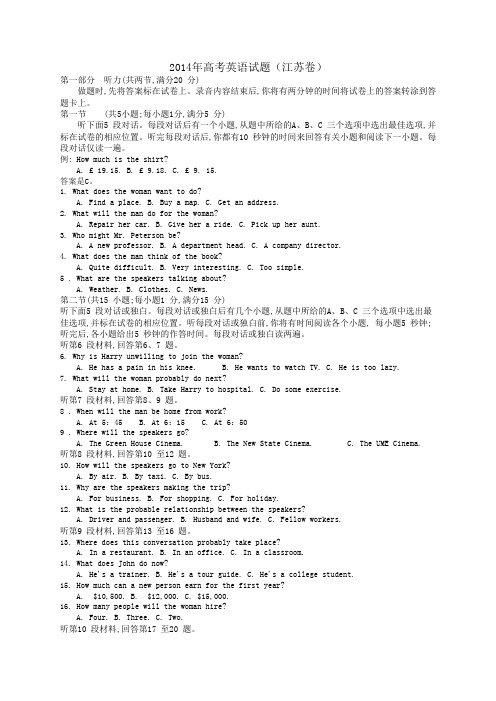
2014年高考英语试题(江苏卷)第一部分听力(共两节,满分20 分)做题时,先将答案标在试卷上。
录音内容结束后,你将有两分钟的时间将试卷上的答案转涂到答题卡上。
第一节 (共5小题;每小题1分,满分5 分)听下面5 段对话。
每段对话后有一个小题,从题中所给的A、B、C 三个选项中选出最佳选项,并标在试卷的相应位置。
听完每段对话后,你都有10 秒钟的时间来回答有关小题和阅读下一小题。
每段对话仅读一遍。
例: How much is the shirt?A. £ 19.15.B. £ 9.18.C. £ 9. 15.答案是C。
1. What does the woman want to do?A. Find a place.B. Buy a map.C. Get an address.2. What will the man do for the woman?A. Repair her car.B. Give her a ride.C. Pick up her aunt.3. Who might Mr. Peterson be?A. A new professor.B. A department head.C. A company director.4. What does the man think of the book?A. Quite difficult.B. Very interesting.C. Too simple.5 . What are the speakers talking about?A. Weather.B. Clothes.C. News.第二节(共15 小题;每小题1 分,满分15 分)听下面5 段对话或独白。
每段对话或独白后有几个小题,从题中所给的A、B、C 三个选项中选出最佳选项,并标在试卷的相应位置。
听每段对话或独白前,你将有时间阅读各个小题, 每小题5 秒钟;听完后,各小题给出5 秒钟的作答时间。
2014年高考英语试题单项选择解析(江苏卷)
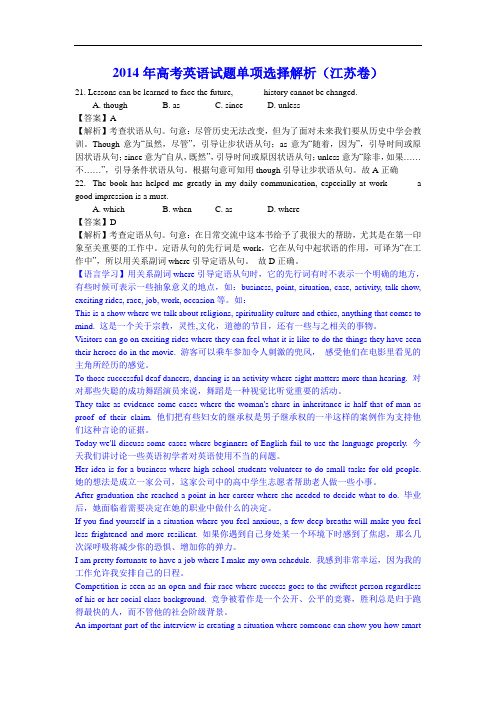
2014年高考英语试题单项选择解析(江苏卷)21. Lessons can be learned to face the future, ______ history cannot be changed.A. thoughB. asC. sinceD. unless【答案】A【解析】考查状语从句。
句意:尽管历史无法改变,但为了面对未来我们要从历史中学会教训。
Though意为“虽然,尽管”,引导让步状语从句;as意为“随着,因为”,引导时间或原因状语从句;since意为“自从,既然”,引导时间或原因状语从句;unless意为“除非,如果……不……”,引导条件状语从句。
根据句意可知用though引导让步状语从句。
故A正确22. The book has helped me greatly in my daily communication, especially at work______ a good impression is a must.A. whichB. whenC. asD. where【答案】D【解析】考查定语从句。
句意:在日常交流中这本书给予了我很大的帮助,尤其是在第一印象至关重要的工作中。
定语从句的先行词是work,它在从句中起状语的作用,可译为“在工作中”,所以用关系副词where引导定语从句。
故D正确。
【语言学习】用关系副词where引导定语从句时,它的先行词有时不表示一个明确的地方,有些时候可表示一些抽象意义的地点,如:business, point, situation, case, activity, talk show, exciting rides, race, job, work, occasion等。
如:This is a show where we talk about religions, spirituality culture and ethics, anything that comes to mind. 这是一个关于宗教,灵性,文化,道德的节目,还有一些与之相关的事物。
2014年高考真题——英语(江苏卷)word版含解析

2014年普通高等学校招生全国统一考试江苏卷英语第一部分听力(共两节,满分30分)做题时,先将答案标在试卷上。
录音内容结束后,你将有两分钟的时间将试卷上的答案转涂到答题卡上。
第一节(共5小题;每小题1.5分,满分7.5分)听下面5段对话。
每段对话后有一个小题,从题中所给的A、B、C三个选项中选出最佳选项,并标在试卷的相应位置。
听完每段对话后,你都有10称钟的时间来回答有关小题如阅读下一小题。
每段对话仅读一遍。
例:How much is the shirt?A. £19.15.B. £9.18.C. £9.15.答案是C。
1. What does the woman want to do?A. Find a place.B. Buy a map.C. Get an address.2. What will the man do for the woman?A. Repair her car.B. Give her a ride..C. Pick up her aunt.3. Who might Mr. Peterson be?A. A new professor.B. A department head.C. A company director.4. What does the man think of the book?A. Quite difficult..B. Very interesting.C. Too simple.5. What are the speakers talking about?A. Weather.B. Clothes.C. News.第二节(共15小题;每小题1.5分,满分22.5分)听下面5段对话或独白。
每段对话或独白后有几个小题,从题中所给的A、B、C三个选项中选出最佳选项,并标在试卷的相应位置。
听每段对话或独白前,你将有时间阅读各个小题,每小题5秒钟;听完后,各小题将给出5秒钟的作答时间。
(完整版)2014江苏高考英语试卷及答案,推荐文档

2014江苏高考英语试卷一、单项选择例: It is generally considered unwise to give a child ________ he or she wants.A. howeverB. whateverC. whicheverD. whenever答案是B。
1.Lessons can be learned to face the future, ________ history cannot be changed.A. thoughB. asC. sinceD. unless2.The book has helped me greatly in my daily communication, especially at work ________ a good impression is a must.A. whichB. whenC. asD. where3.—How much do you know about the Youth Olympic Games to be held in Nanjing?—Well, the media ________ it in a variety of forms.A. coverB. will coverC. have coveredD. covered4.Tom always goes jogging in the morning and he usually does push-ups too to stay ________.A. in placeB. in orderC. in shapeD. in fashion5.Top graduates from universities are ________ by major companies.A. chasedB. registeredC. offeredD. compensated6.—What a mess! You are always so lazy!—I’m not to blame, mum. I am ________ you have made me.A. howB. what \C. thatD. who7.She was put under house arrest two years ago but remained a powerful ________ in last year’s election.A. symbolB. portraitC. identityD. statue8.The idea “happiness, ” ________, will not sit still for easy definit ion.A. to be rigidB. to be sureC. to be perfectD. to be fair9.The lecture ________, a lively question-and-answer session followed.A. being givenB. having givenC. to be givenD. having been given 10.—Dad, I don’t think Oliver the right sort of person for the job.—I see. I’ll go right away and ________.A. pay him backB. pay him offC. put him awayD. put him off11.It was sad to me that they, so poor themselves, ________ bring me food.A. mightB. wouldC. shouldD. could12.I can’t meet you on Sunday. I’ll be ________ occupied.A. alsoB. justC. neverthelessD. otherwise13.Legend has it that the origin of the Dragon Boat Festival is to ________ the soul of Qu Yuan.A. rememberB. remindC. recoverD. recall14.Good families are much to all their members, but ________ to none.A. somethingB. anythingC. everythingD. nothing15.—________ ! Somebody has left the lab door open.—Don’t look at me.A. Dear meB. Hi, thereC. Thank goodnessD. Come on二、完形填空Dale Carnegie rose from the unknown of a Missouri farm to international fame because he found a way to fill a universal human need.It was a need that he first back in 1906 when young Dale was a junior at State Teachers College in Warrensburg. To get an , he was struggling against many difficulties. His family was poor. His Dad couldn’t afford the at college, so Dale had to ride horseback 12 miles to attend classes. Study had to be done his farm-work routines. Hewithdrew from many school activities he didn’t have the time or the . He had only one good suit. He tried the football team, but the coach turned him down for being too . During this period Dale was slowly an inferiority complex (自卑感), which his mother knew could him from achieving his real potential. She that Dale join the debating team, believing that in speaking could give him the confidence and recognition that he needed.Dale took his mother’s advice, tried desperately and after several attempts made it. This proved to be a point in his life. Speaking before groups did help him gain the he needed. By the time Dale was a senior, he had won every top honor in . Now other students were coming to him for coaching and they, , were winning contests.Out of this early struggle to his feelings of inferiority, Dale came to understand that the ability to an idea to an audience builds a person’s confidence. And, it, Dale knew he could do anything he wanted to do—and so could others.16.A. admitted B. filled C. supplied D. recognized 17.A. assignment B. education C. advantage D. instruction 18.A. training B. board C. teaching D. equipment 19.A. between B. during C. over D. through20.A. while B. when C. because D. though21.A. permits B. interest C. talent D. clothes22.A. on B. for C. in D. with23.A. light B. flexible C. optimistic D. outgoing24.A. gaining B. achieving C. developing D. obtaining25.A. prevent B. protect C. save D. free26.A. suggested B. demanded C. required D. insisted27.A. presence B. practice C. patience D. potential28.A. hopefully B. certainly C. finally D. naturally29.A. key B. breaking C. basic D. turning30.A. progress B. experience C. competence D. confidence 31.A. horse-riding B. football C. speech D. farming32.A. in return B. in brief C. in turn D. in fact33.A. convey B. overcome C. understand D. build34.A. express B. stress C. contribute D. repeat35.A. besides B. beyond C. like D. with三、阅读理解A36.Why did the BeauxArts style attract American entrepreneurs?A. It helped display their money status.B. It was created by famous architects.C. It was named after a famous institute.D. It represented the 19th century urban culture.37.What is unique of SieMatic BeauxArts?A. Its designs are anti-conventional.B. Its designs come from famous structures.C. Its customers can enjoy their own composition.D. Its customers can choose from various new styles.BHowever wealthy we may be, we can never find enough hours in the day to do everything we want. Economics deals with this problem through the concept of opportunity cost, which simply refers to whether someone’s time or money could be better spent on something else.Every hour of our time has a value. For every hour we work at one job we could quite easily be doing another, or be sleeping or watching a film. Each of these options has a different opportunity cost—namely, what they cost us in missed opportunities.Say you intend to watch a football match but the tickets are expensive and it will take you a couple of hours to get to and from the stadium. Why not, you might reason, watch the game from home and use the leftover money and time to have dinner with friends? This—the alternative use of your cash and time—is the opportunity cost.For economists, every decision is made by knowledge of what one must forgo—in terms of money and enjoyment—in order to take it up. By knowing precisely what you are receiving and what you are missing out on, you ought to be able to make better-informed, more reasonable decisions. Consider that most famous economic rule of all: there’s no such thing as a free lunch. Even if someone offers to take you out to lunch for free, the time you will spend in the restaurant still costs you something in terms of forgone opportunities.Some people find the idea of opportunity cost extremely discouraging: imagine spending your entire life calculating whether your time would be better spe nt elsewhere doing something more profitable or enjoyable. Yet, in a sense it’s human nature to do precisely that—we assess the advantages and disadvantages of decisions all the time.In the business world, a popular phrase is “value for money.” People wan t their cash to go as far as possible. However, another is fast obtaining an advantage: “value for time.” The biggest restriction on our resources is the number of hours we can devote to something, so we look to maximize the return we get on our investment of time. By reading this passage you are giving over a bit of your time which could be spent doing other activities, such as sleeping and eating. In return, however, this passage will help you to think like an economist, closely considering the opportunity cost of each of your decisions.38.According to the passage, the concept of “opportunity cost” is applied to ________.A. making more moneyB. taking more opportunitiesC. reducing missed opportunitiesD. weighing the choice of opportunities39.The “leftover ... time” in Paragraph 3 probably refers to the time ________.A. spared for watching the match at homeB. taken to have dinner with friendsC. spent on the way to and from the matchD. saved from not going to watch the match40.What are forgone opportunities?A. Opportunities you forget in decision-making.B. Opportunities you give up for better ones.C. Opportunities you miss accidentally.D. Opportunities you make up for.CMost damagingly, anger weakens a person’s ability to think c learly and keep control over his behaviour. The angry person loses objectivity in evaluating the emotional significance of the person or situation that arouses his anger.Not everyone experiences anger in the same way; what angers one person may amuse another. The specific expression of anger also differs from person to person based on biological and cultural forces. In contemporary culture, physical expressions of anger are generally considered too socially harmful to be tolerated. We no longer regard duels (决斗)as an appropriate expression of anger resulting from one person’s awareness of insulting behaviour on the part of another.Anger can be identified in the brain, where the electrical activity changes. Under most conditions EEG (脑电图)measures of electrical activity show balanced activity between the right and left prefrontal (额叶前部)areas. Behaviourally this corresponds to the general even-handed disposition (意向)that most of us possess most of the time. But when we are angry the EEG of the right and left prefrontal areas aren’t balanced and, as a result of this, we’re likely to react. And our behavioural response to anger is different from our response to other emotions, whether positive or negative.Most positive emotions are associated with approach behaviour: we move closer to people we like. Most negative emotions, in contrast, are associated with avoidance behaviour: we move away from people and things that we dislike or that make us anxious. But anger is an exception to this pattern. The angrier we are, the more likely we are to move towards the object of our anger. This corresponds to what psychologists refer to as of ensive anger: the angry person moves closer in order to influence and control the person or situation causing his anger. This approach-and-confront behaviour is accompanied by a leftward prefrontal asymmetry (不对称)of EEG activity. Interestingly, this asymmetry lessens if the angry person can experience empathy (同感)towards the individual who is bringing forth the angry response. In defensive anger, in contrast, the EEG asymmetry is directed to the right and the angry person feels helpless in the face of the anger-inspiring situation. 41.The “duels” example i n Paragraph 2 proves that the expression of anger ________.A. usually has a biological basisB. varies among peopleC. is socially and culturally shapedD. influences one’s thinking and evaluation 42.What changes can be found in an angry brain?A. Balanced electrical activity can be spotted.B. Unbalanced patterns are found in prefrontal areas.C. Electrical activity corresponds to one’s behaviour.D. Electrical activity agrees with one’s disposition.43.Which of the following is typical of offensive anger?A. Approaching the source of anger.B. Trying to control what is disliked.C. Moving away from what is disliked.D. Feeling helpless in the face of anger. 44.What is the key message of the last paragraph?A. How anger differs from other emotions.B. How anger relates to other emotions.C. Behavioural responses to anger.D. Behavioural patterns of anger.D45.Why is June 6, 1990 a special day for Mommy?A. Her dream of being a mother came true.B. She found her origin from her Chinese mother.C. She wrote the letter to her daughter.D. Her female line was well linked.46.How does Mommy feel about her being given away?A. It is bitter and disappointing.B. It is painful but understandable.C. She feels sorry but sympathetic.D. She feels hurt and angry.47.What does “I stood out like a sore thumb” in Paragraph 5 mean?A. I walked clumsily out of pains.B. I was not easy to love due to jealousy.C. I was impatient out of fear.D. I looked different from others.48.What can be inferred from Mommy’s Anglo family life?A. She used to experience an identity crisis.B. She fought against her American identity.C. She forgot the pains of her early years.D. She kept her love for Asia from childhood.49.Why did Mommy name her daughter “Shao-ming?”A. To match her own birth-name.B. To brighten the lives of the family.C. To identify her with Chinese origin.D. To justify her pride in Chinese culture.50.By “Your past is more complete than mine,” Mommy means ________.A. her past was completed earlier than Shao-ming’sB. Shao-ming has got motherly care and a sense of rootsC. her mother didn’t comfort her the way she did Shao-mingD. her past was spent brokenly, first in Asia, then in the US六、阅读填空51.请阅读下面短文,并根据所读内容在文章后表格中的空格里填入一个最恰当的单词。
2014年高考真题(英语)江苏卷 纯Word版解析可编辑

2014年普通高等学校招生全国统一考试(江苏卷)第二部分:英语知识运用(共两节,满分35分)第一节:单项填空(共15小题;每小题1分,满分15分)请阅读下面各题,从题中所给的A、B、C、D四个选项中,选出最佳选项。
21.[2014·江苏卷] Lessons can be learned to face the future, ________ history cannot be changed.A.though B.asC.since D.unless21.A考查状语从句连接词的用法。
句意:尽管历史不可能被改变,但是我们可以吸取教训来迎接未来。
根据语境可知此处用though引导让步状语从句,故A项正确。
22.[2014·江苏卷] The book has helped me greatly in my daily communication, especially at work ________ a good impression is a must.A.which B.whenC.as D.where22.D考查定语从句。
句意:这本书在我的日常交流方面给予了我很大帮助,尤其是在必须给别人留下一个好印象的工作中。
分析句子结构可知,先行词为抽象名词work,定语从句中缺少地点状语,故用where引导。
23.[2014·江苏卷] —How much do you know about the Youth Olympic Games to be held in Nanjing?—Well, the media ________ it in a variety of forms.A.cover B.will coverC.have covered D.covered23.C考查动词的时态与语态。
句意:“你对于即将在南京召开的青奥会知道多少?”“哦,媒体已经以多种多样的形式对其进行了报道。
2014高考江苏卷详解
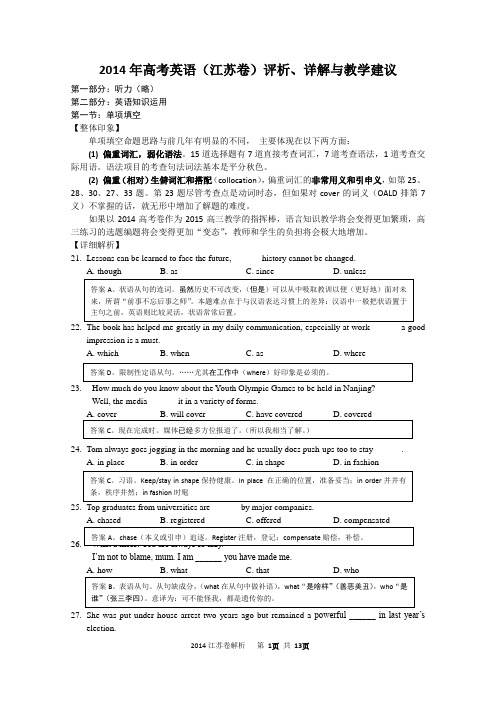
2014年高考英语(江苏卷)评析、详解与教学建议第一部分:听力(略)第二部分:英语知识运用第一节:单项填空【整体印象】单项填空命题思路与前几年有明显的不同,主要体现在以下两方面:(1) 偏重词汇,弱化语法。
15道选择题有7道直接考查词汇,7道考查语法,1道考查交际用语。
语法项目的考查句法词法基本是平分秋色。
(2) 偏重(相对)生僻词汇和搭配(collocation),偏重词汇的非常用义和引申义,如第25、28、30、27、33题。
第23题尽管考查点是动词时态,但如果对cover的词义(OALD排第7义)不掌握的话,就无形中增加了解题的难度。
如果以2014高考卷作为2015高三教学的指挥棒,语言知识教学将会变得更加繁琐,高三练习的选题编题将会变得更加“变态”,教师和学生的负担将会极大地增加。
【详细解析】21. Lessons can be learned to face the future, ______ history cannot be changed.A. thoughB. asC. sinceD. unlessimpression is a must.A. whichB. whenC. asD. where23. --How much do you know about the Youth Olympic Games to be held in Nanjing?--Well, the media ______ it in a variety of forms.24. Tom always goes jogging in the morning and he usually does push-ups too to stay ______.A. in placeB. in orderC. in shapeD. in fashion25. Top graduates from universities are ______ by major companies.A. chasedB. registeredC. offeredD. compensated--I’m not to blame, mum. I am ______ you have made me.27. She was put under house arrest two years ago but remained a powerful ______ in last year’selection.A. being givenB. having givenC. to be givenD. having been given30. --Dad, I don’t think Oliver the right sort of person for the job.--I see. I’ll go right away and ______.31. It was sad to me that they, so poor themselves, ______ bring me food.A. mightB. wouldC. shouldD. could32. I can’t meet you on Sunday. I’ll be ______ occupied.A. alsoB. justC. neverthelessD. otherwise34. Good families are much to all their members, but ______ to none.A. somethingB. anythingC. everythingD. nothing35. --______! Somebody has left the lab door open.--Don’t look at me.第二节:完形填空【整体印象】完形填空为记叙文,励志故事,简述戴尔卡耐基成功成为演讲家的故事。
2014年江苏英语高考试题(卷)含答案解析和解析
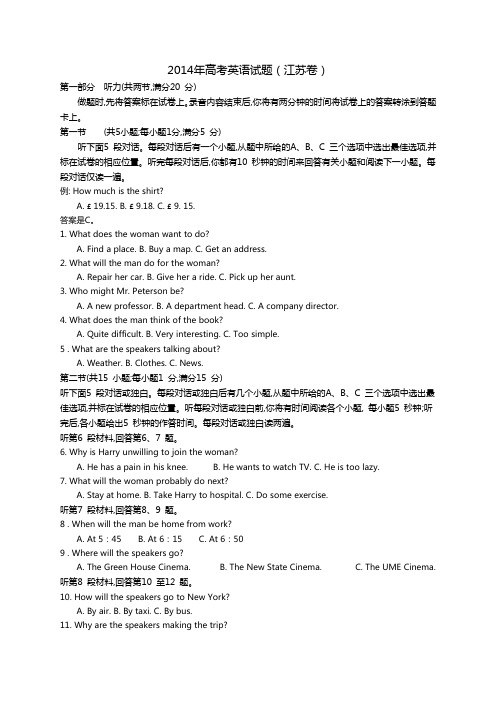
2014年高考英语试题(江苏卷)第一部分听力(共两节,满分20 分)做题时,先将答案标在试卷上。
录音内容结束后,你将有两分钟的时间将试卷上的答案转涂到答题卡上。
第一节(共5小题;每小题1分,满分5 分)听下面5 段对话。
每段对话后有一个小题,从题中所给的A、B、C 三个选项中选出最佳选项,并标在试卷的相应位置。
听完每段对话后,你都有10 秒钟的时间来回答有关小题和阅读下一小题。
每段对话仅读一遍。
例: How much is the shirt?A. £ 19.15.B. £ 9.18.C. £ 9. 15.答案是C。
1. What does the woman want to do?A. Find a place.B. Buy a map.C. Get an address.2. What will the man do for the woman?A. Repair her car.B. Give her a ride.C. Pick up her aunt.3. Who might Mr. Peterson be?A. A new professor.B. A department head.C. A company director.4. What does the man think of the book?A. Quite difficult.B. Very interesting.C. Too simple.5 . What are the speakers talking about?A. Weather.B. Clothes.C. News.第二节(共15 小题;每小题1 分,满分15 分)听下面5 段对话或独白。
每段对话或独白后有几个小题,从题中所给的A、B、C 三个选项中选出最佳选项,并标在试卷的相应位置。
听每段对话或独白前,你将有时间阅读各个小题, 每小题5 秒钟;听完后,各小题给出5 秒钟的作答时间。
2014_年江苏高考英语真题及解析
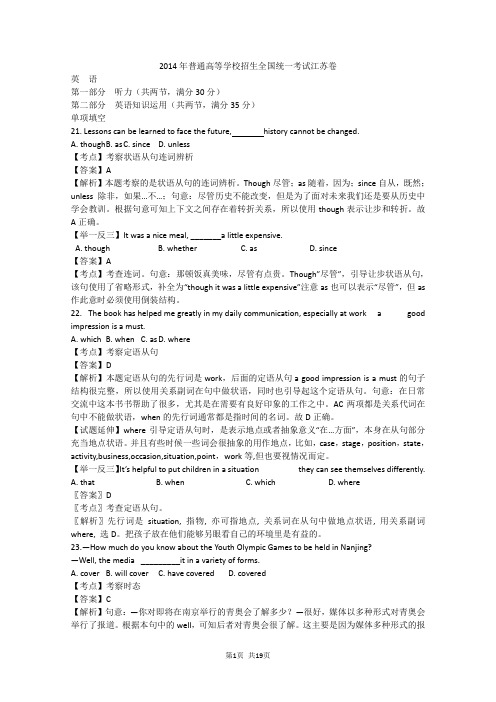
2014年普通高等学校招生全国统一考试江苏卷英语第一部分听力(共两节,满分30分)第二部分英语知识运用(共两节,满分35分)单项填空21. Lessons can be learned to face the future, history cannot be changed.A. thoughB. asC. sinceD. unless【考点】考察状语从句连词辨析【答案】A【解析】本题考察的是状语从句的连词辨析。
Though尽管;as随着,因为;since自从,既然;unless除非,如果…不…;句意:尽管历史不能改变,但是为了面对未来我们还是要从历史中学会教训。
根据句意可知上下文之间存在着转折关系,所以使用though表示让步和转折。
故A正确。
【举一反三】It was a nice meal, _______a little expensive.A. thoughB. whetherC. asD. since【答案】A【考点】考查连词。
句意:那顿饭真美味,尽管有点贵。
Though”尽管”,引导让步状语从句,该句使用了省略形式,补全为“though it was a little expensive”注意as也可以表示“尽管”,但as 作此意时必须使用倒装结构。
22. The book has helped me greatly in my daily communication, especially at work a good impression is a must.A. whichB. whenC. asD. where【考点】考察定语从句【答案】D【解析】本题定语从句的先行词是work,后面的定语从句a good impression is a must的句子结构很完整,所以使用关系副词在句中做状语,同时也引导起这个定语从句。
句意:在日常交流中这本书书帮助了很多,尤其是在需要有良好印象的工作之中。
2014年江苏省高考英语试题解析版
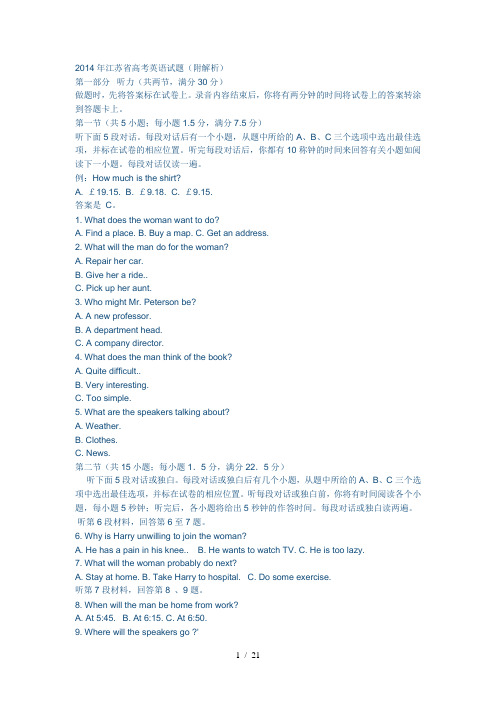
2014年江苏省高考英语试题(附解析)第一部分听力(共两节,满分30分)做题时,先将答案标在试卷上。
录音内容结束后,你将有两分钟的时间将试卷上的答案转涂到答题卡上。
第一节(共5小题;每小题1.5分,满分7.5分)听下面5段对话。
每段对话后有一个小题,从题中所给的A、B、C三个选项中选出最佳选项,并标在试卷的相应位置。
听完每段对话后,你都有10称钟的时间来回答有关小题如阅读下一小题。
每段对话仅读一遍。
例:How much is the shirt?A. £19.15.B. £9.18.C. £9.15.答案是C。
1. What does the woman want to do?A. Find a place.B. Buy a map.C. Get an address.2. What will the man do for the woman?A. Repair her car.B. Give her a ride..C. Pick up her aunt.3. Who might Mr. Peterson be?A. A new professor.B. A department head.C. A company director.4. What does the man think of the book?A. Quite difficult..B. Very interesting.C. Too simple.5. What are the speakers talking about?A. Weather.B. Clothes.C. News.第二节(共15小题;每小题1.5分,满分22.5分)听下面5段对话或独白。
每段对话或独白后有几个小题,从题中所给的A、B、C三个选项中选出最佳选项,并标在试卷的相应位置。
听每段对话或独白前,你将有时间阅读各个小题,每小题5秒钟;听完后,各小题将给出5秒钟的作答时间。
2014年普通高等学校招生全国统一考试(江苏卷)英语答案解析(正式版)
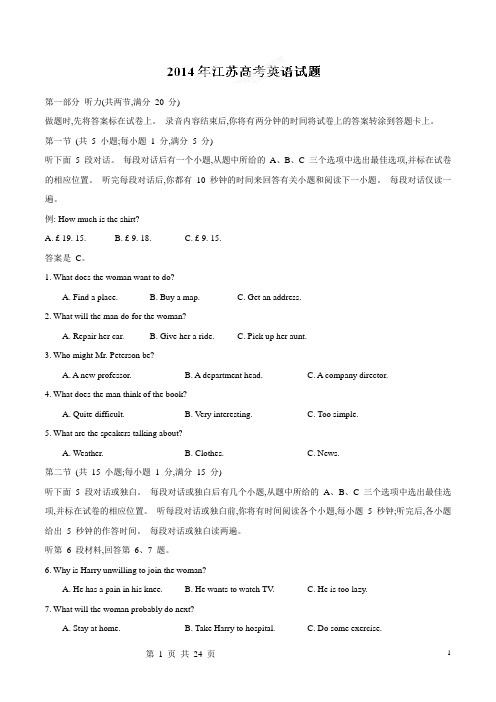
第一部分听力(共两节,满分20 分)做题时,先将答案标在试卷上。
录音内容结束后,你将有两分钟的时间将试卷上的答案转涂到答题卡上。
第一节(共5 小题;每小题1 分,满分5 分)听下面5 段对话。
每段对话后有一个小题,从题中所给的A、B、C 三个选项中选出最佳选项,并标在试卷的相应位置。
听完每段对话后,你都有10 秒钟的时间来回答有关小题和阅读下一小题。
每段对话仅读一遍。
例: How much is the shirt?A. £ 19. 15.B. £ 9. 18.C. £ 9. 15.答案是C。
1. What does the woman want to do?A. Find a place.B. Buy a map.C. Get an address.2. What will the man do for the woman?A. Repair her car.B. Give her a ride.C. Pick up her aunt.3. Who might Mr. Peterson be?A. A new professor.B. A department head.C. A company director.4. What does the man think of the book?A. Quite difficult.B. Very interesting.C. Too simple.5. What are the speakers talking about?A. Weather.B. Clothes.C. News.第二节(共15 小题;每小题 1 分,满分15 分)听下面 5 段对话或独白。
每段对话或独白后有几个小题,从题中所给的A、B、C 三个选项中选出最佳选项,并标在试卷的相应位置。
听每段对话或独白前,你将有时间阅读各个小题,每小题 5 秒钟;听完后,各小题给出 5 秒钟的作答时间。
2014年江苏省高考英语真题试题(有答案)

2014年江苏高考英语试题第一部分听力(共两节,满分20 分)做题时,先将答案标在试卷上。
录音内容结束后,你将有两分钟的时间将试卷上的答案转涂到答题卡上。
第一节(共5 小题;每小题1 分,满分5 分)听下面 5 段对话。
每段对话后有一个小题,从题中所给的A、B、C 三个选项中选出最佳选项,并标在试卷的相应位置。
听完每段对话后,你都有10 秒钟的时间来回答有关小题和阅读下一小题。
每段对话仅读一遍。
例: How much is the shirt?A. £ 19. 15.B. £ 9. 18.C. £ 9. 15.答案是C。
1. What does the woman want to do?A. Find a place.B. Buy a map.C. Get an address.2. What will the man do for the woman?A. Repair her car.B. Give her a ride.C. Pick up her aunt.3. Who might Mr. Peterson be?A. A new professor.B. A department head.C. A company director.4. What does the man think of the book?A. Quite difficult.B. Very interesting.C. Too simple.5. What are the speakers talking about?A. Weather.B. Clothes.C. News.第二节(共15 小题;每小题 1 分,满分15 分)听下面5 段对话或独白。
每段对话或独白后有几个小题,从题中所给的A、B、C 三个选项中选出最佳选项,并标在试卷的相应位置。
听每段对话或独白前,你将有时间阅读各个小题,每小题5 秒钟;听完后,各小题给出5 秒钟的作答时间。
2014年高考江苏卷英语试卷答案解析

2014年高考江苏卷英语试卷答案解析英语第一部分听力(共两节,满分30分)做题时,先将答案标在试卷上。
录音内容结束后,你将有两分钟的时间将试卷上的答案转涂到答题卡上。
第一节(共5小题;每小题1.5分,满分7.5分)听下面5段对话。
每段对话后有一个小题,从题中所给的A、B、C三个选项中选出最佳选项,并标在试卷的相应位置。
听完每段对话后,你都有10称钟的时间来回答有关小题如阅读下一小题。
每段对话仅读一遍。
例:How much is the shirt?A. £19.15.B. £9.18.C. £9.15.答案是C。
1. What does the woman want to do?A. Find a place.B. Buy a map.C. Get an address.2. What will the man do for the woman?A. Repair her car.B. Give her a ride..C. Pick up her aunt.3. Who might Mr. Peterson be?A. A new professor.B. A department head.C. A company director.4. What does the man think of the book?A. Quite difficult..B. Very interesting.C. Too simple.5. What are the speakers talking about?A. Weather.B. Clothes.C. News.第二节(共15小题;每小题1.5分,满分22.5分)听下面5段对话或独白。
每段对话或独白后有几个小题,从题中所给的A、B、C三个选项中选出最佳选项,并标在试卷的相应位置。
听每段对话或独白前,你将有时间阅读各个小题,每小题5秒钟;听完后,各小题将给出5秒钟的作答时间。
普通高等学校招生全国统一考试英语试题(江苏卷,解析版)(1)
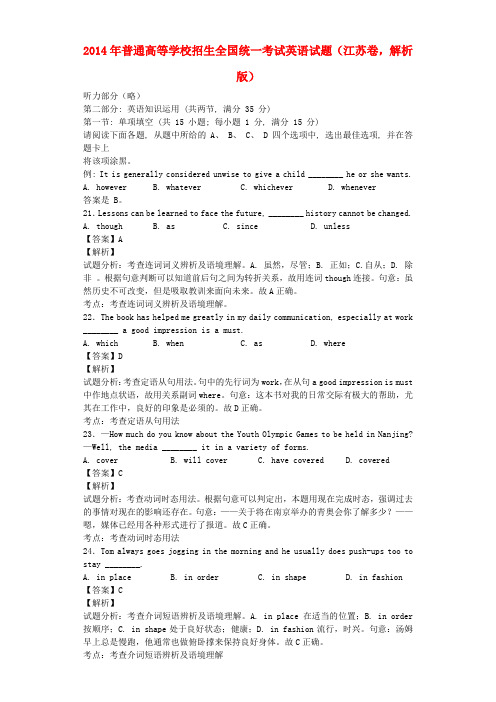
2014年普通高等学校招生全国统一考试英语试题(江苏卷,解析版)听力部分(略)第二部分: 英语知识运用 (共两节, 满分 35 分)第一节: 单项填空 (共 15 小题; 每小题 1 分, 满分 15 分)请阅读下面各题, 从题中所给的 A、 B、 C、 D 四个选项中, 选出最佳选项, 并在答题卡上将该项涂黑。
例: It is generally considered unwise to give a child ________ he or she wants.A. howeverB. whateverC. whicheverD. whenever答案是 B。
21.Lessons can be learned to face the future, ________ history cannot be changed.A. thoughB. asC. sinceD. unless【答案】A【解析】试题分析:考查连词词义辨析及语境理解。
A. 虽然,尽管;B. 正如;C.自从;D. 除非。
根据句意判断可以知道前后句之间为转折关系,故用连词though连接。
句意:虽然历史不可改变,但是吸取教训来面向未来。
故A正确。
考点:考查连词词义辨析及语境理解。
22.The book has helped me greatly in my daily communication, especially at work ________ a good impression is a must.A. whichB. whenC. asD. where【答案】D【解析】试题分析:考查定语从句用法。
句中的先行词为work,在从句a good impression is must 中作地点状语,故用关系副词where。
句意:这本书对我的日常交际有极大的帮助,尤其在工作中,良好的印象是必须的。
故D正确。
考点:考查定语从句用法23.—How much do you know about the Youth Olympic Games to be held in Nanjing? —Well, the media ________ it in a variety of forms.A. coverB. will coverC. have coveredD. covered【答案】C【解析】试题分析:考查动词时态用法。
2014年江苏英语高等考试真命题(含答案解析)

2014年江苏高考英语试题第二部分: 英语知识运用(共两节, 满分35 分)第一节: 单项填空(共15 小题; 每小题1 分, 满分15 分)请阅读下面各题, 从题中所给的A、B、C、D 四个选项中, 选出最佳选项, 并在答题卡上将该项涂黑。
例: It is generally considered unwise to give a child ________ he or she wants.A. howeverB. whateverC. whicheverD. whenever答案是B。
21. Lessons can be learned to face the future, ________ history cannot be changed.A. thoughB. asC. sinceD. unless22. The book has helped me greatly in my daily communication, especially at work ________ a goodimpression is a must.A. whichB. whenC. asD. where23. —How much do you know about the Youth Olympic Games to be held in Nanjing?—Well, the media ________ it in a variety of forms.A. coverB. will coverC. have coveredD. covered24. Tom always goes jogging in the morning and he usually does push-ups too to stay ________.A. in placeB. in orderC. in shapeD. in fashion25. T op graduates from universities are ________ by major companies.A. chasedB. registeredC. offeredD. compensated26. —What a mess! You are always so lazy!—I’m not to blame, mum. I am ________ you have made me.A. howB. whatC. thatD. who27. She was put under house arrest two years ago but remained a powerful ________ in last year’s election.A. symbolB. portraitC. identityD. statue28. The idea “happiness, ”________, will not sit still for easy definition.A. to be rigidB. to be sureC. to be perfectD. to be fair29. The lecture ________, a lively question-and-answer session followed.A. being givenB. having givenC. to be givenD. having been given30. —Dad, I don’t think Oliver the right sort of person for the job.—I see. I’ll go right away and ________.A. pay him backB. pay him offC. put him awayD. put him off31. It was sad to me that they, so poor themselves, ________ bring me food.A. mightB. wouldC. shouldD. could32. I can’t meet you on Sunday. I’ll be ________ occupied.A. alsoB. justC. neverthelessD. otherwise33. Legend has it that the origin of the Dragon Boat Festival is to ________ the soul of Qu Yuan.A. rememberB. remindC. recoverD. recall34. Good families are much to all their members, but ________ to none.A. somethingB. anythingC. everythingD. nothing35. —________ ! Somebody has left the lab door open.—Don’t look at me.A. Dear meB. Hi, thereC. Thank goodnessD. Come on第二节: 完形填空(共20 小题; 每小题1 分, 满分20 分)请阅读下面短文, 从短文后各题所给的A、B、C、D 四个选项中, 选出最佳选项, 并在答题卡上将该项涂黑。
高考真题——英语(江苏卷)word版含解析

2014年普通高等学校招生全国统一考试江苏卷英语第一部分听力(共两节,满分30分)做题时,先将答案标在试卷上。
录音内容结束后,你将有两分钟的时间将试卷上的答案转涂到答题卡上。
第一节(共5小题;每小题1.5分,满分7.5分)听下面5段对话。
每段对话后有一个小题,从题中所给的A、B、C三个选项中选出最佳选项,并标在试卷的相应位置。
听完每段对话后,你都有10称钟的时间来回答有关小题如阅读下一小题。
每段对话仅读一遍。
例:How much is the shirt?A. £19.15.B. £9.18.C. £9.15.答案是C。
1. What does the woman want to do?A. Find a place.B. Buy a map.C. Get an address.2. What will the man do for the woman?A. Repair her car.B. Give her a ride..C. Pick up her aunt.3. Who might Mr. Peterson be?A. A new professor.B. A department head.C. A company director.4. What does the man think of the book?A. Quite difficult..B. Very interesting.C. Too simple.5. What are the speakers talking about?A. Weather.B. Clothes.C. News.第二节(共15小题;每小题1.5分,满分22.5分)听下面5段对话或独白。
每段对话或独白后有几个小题,从题中所给的A、B、C三个选项中选出最佳选项,并标在试卷的相应位置。
听每段对话或独白前,你将有时间阅读各个小题,每小题5秒钟;听完后,各小题将给出5秒钟的作答时间。
- 1、下载文档前请自行甄别文档内容的完整性,平台不提供额外的编辑、内容补充、找答案等附加服务。
- 2、"仅部分预览"的文档,不可在线预览部分如存在完整性等问题,可反馈申请退款(可完整预览的文档不适用该条件!)。
- 3、如文档侵犯您的权益,请联系客服反馈,我们会尽快为您处理(人工客服工作时间:9:00-18:30)。
2014江苏高考英语卷答案解析21.Lessons can be learned to face the future, history cannot be changed.A.thoughB. asC. sinceD. unless21.A. 本题考察连词用法。
根据句意结合常识来判断,A选项更合理:“尽管历史无法改变,教训却能够被吸取来面对未来。
”B选项也有尽管的意思,但用于“n/adj/adv+as+主谓”结构中。
C选项是最大干扰项,“既然,由于”。
似乎说得通,但是题干前后两句并非因果关系。
D选项相当于if not.22.The book has helped me greatly in my daily communication, especially at work a good impression is a must.A. whichB.whenC.asD. where22. D. 本题考察定语从句关系词的用法。
其解题的突破口是先行词的判断及句子成分的分析。
本题先行词为work,可以理解为抽象的地点;而从句部分不缺主语也不缺宾语,因此可以排除关系代词,而选择可以做状语的关系副词where. 句意为“这本书在日常交际中给予我很大的帮助,尤其是在第一印象至关重要的工作中。
”23.---How much do you know about the Youth Olympic Games to be held in Nanjing?--- Well, the media it in a variety of forms.A.coverB. will coverC.have coveredD.covered23. C. 本题考察时态的用法。
“你了解将在南京举行的青奥会么?”“各大媒体已进行了全方位的报道。
”24.Tom always goes jogging in the morning and he usually does push-ups too to stay .A.in placeB.in orderC.in shapeD.in fashion24.C. 本题考察介词短语。
A.就位,到位。
B.井然有序。
C.保持体形 D. 流行。
根据句意,“Tom坚持早上跑步并且还常常做俯卧撑来维持体形.”25. Top graduates from universities are ______ by major companies.A. chasedB. registeredC. offeredD. compensate25.A. 本题考察动词词汇量。
A.追逐,追求。
B.注册,登记。
C.提供,常接双宾语。
D.赔偿,补偿。
根据句意可知,高才生受到各大公司的青睐,成为争相录用的对象。
26.---What a mess! You are always so lazy!---I’m not to blame, mum, I am you have made me.A.howB.whatC.thatD.who26.B.本题考察名词性从句。
“这么乱!你总是这么懒!”“妈妈,要怪也不应当怪我啊。
我这么懒也是你娇惯出来的。
”言外之意是,“You made me what I am.”27.She was put under house arrest two years ago but remained powerful in the last year’s election.A.symbolB.portraitC.identityD.statue27.A. 她两年前被软禁,但是在去年的选举中仍然是势力强大的代表人物。
本题考察名词词汇量。
A. 象征,代表。
B.肖像C.身份。
D. 雕像,塑像。
28.The idea “happiness”, , will not sit still for easy definition.A.to be rigidB.to be sureC.to be perfectD.to be fair28.B.本题考察不定式做插入语的常见短语。
A.刻板地,僵硬地。
B. 毫无疑问,可以肯定地说。
C. 为了完美。
D.公平地说。
根据句意“幸福的概念,可以肯定地说,并非一成不变,因此很难定义什么是幸福。
”29.The lecture , a lively question-and-answer session followed.A.being givenB.having givenC.to be givenD.having been given29. D. 本题考察非谓语动词的用法。
根据后半句“热闹的问答环节紧随其后”可知,前半句说的是“一场讲座结束了”。
两件事情先后发生,并且有明确的先后关系,先发生的一般用现在分词的完成式做状语,又因为是被动,所以应该是having been given.30. ---Dad, I don’t think he is the right sort of person for the job.---I see. I’ll go right away and .A.pay him backB.pay him offC.put him awayD.put him off30. B. 本题考察动词词组。
A. pay sb. back意思为惩罚报复某人。
B.pay sb. off意思为付清工资后解雇。
C.收拾,整理。
D.推迟。
31.It was sad to me that they, so poor themselves, bring me food.A.mightB.wouldC.shouldD.could31.C. “让我难为情的是,他们自己那么穷,竟然还要给我带吃的。
”本题考察情态动词的用法。
Should有竟然的意思,表惊讶。
32.I can’t meet you on Sunday. I’ll be occupied.A.alsoB.justC.neverthelessD.otherwise32.D. “周日没法来看你,我另外有事。
”otherwise, 另外。
33.Legend has it that the origin of the Dragon Boat Festival is to the soul of Qu Yuan.A.rememberB.remindC.recoverD.recall33. D. 本题考察动词词汇量。
“传说端午节最初是为了给屈原招魂。
”A.记住。
B.提醒。
C.康复,恢复。
D.召回。
34.Good families are much to all their members, but to none.A.somethingB.anythingC.everythingD.nothing34.C. 优秀的家庭对于他们的成员来说意义重大,却不代表一切。
35.--- ! Somebody has left the lab door open.---Don’t look at me.A. Dear meB. Hi, thereC. Thank goodnessD. Come on35.A.本题考察交际用语。
“谁最后走连实验室的门也没关!”A.表惊讶,天呢!B.大家好。
C.谢天谢地。
D. 用语鼓励或催促对方。
81. 阅读下面短文,并按照要求用英语写一篇150词左右的文章。
When we read newspapers, we often come across such English words as "AIDS" and "PK."When we watch TV, we frequently hear words like "NBA" or "PM2.5." When we speak, weautomatically use words like "OUT" or "Bye-bye." English words and expressions like these are getting popular. They have already become part of our daily language. And 239 English words have been included in the latest Dictionary of Contemporary Chinese.The inclusion has started a heated discussion. A group of scholars signed a letter of complaint over the inclusion of these English words, which, they think, goes against Chinese language policies. They not only worry that Chinese is borrowing an increasing number of English words but are alsoconcerned that the inclusion may hurt the dignity of the Chinese language. However, others are in favor of the inclusion because it is hard to say whether it will threaten the Chinese language. They believe the selection is mostly a result of their function and use in daily life.【写作内容】1.用约30个单词写出上文概要;2.用约120个单词发表你的观点,内容包括:(1)支持或反对汉语词典收录英语词汇;(2)用2-3个理由或论据支撑你的观点。
【写作要求】1.可以支持文中任一观点,但必须提供理由或论据;2.阐述观点或提供论据时,不能直接引用原文语句;3.作文中不能出现真实姓名和学校名称;4.不必写标题。
【评分标准】内容完整,语言规范,语篇连贯,词数适当。
【考点】考察任务型写作【写作指导】本文属于任务型写作,要求简单描述短文内容并就短文内容发表个人的观点。
仍然属于议论文的范围。
所以使用一般现在时和第三人称。
本文讨论的话题是:很多英语单词进入中文词典。
